Based on the December 9th, 2011 Premium Update. Visit our archives for more gold & silver articles.
Todays EU summit has been billed as the best-- perhaps the last-- opportunity to save the euro. As we publish todays essay, we still dont know the results, and gold, like most asset classes, will react to headlines coming out of Europe. Will Merkozy, (ladies first), the leaders of Germany and France, be able to pull a rabbit out of the hat and save the day? On Monday the two issued an ultimatum demanding that all 17 nations in the eurozone agree to a change in European treaties that would compel them to balance budgets or face sanctions. German officials insist that budget discipline will restore investor confidence. However, the Franco-German plan could exacerbate Europes fundamental problem, which is a lack of growth.
On Wednesday Germany insisted that its European partners must undertake the politically charged process of changing European Union treaties, or at the very least, accept a binding new eurozone accord. It is likely that gold will rally in the event of a positive outcome from the summit since the yellow metal has been recently trading in correlation to risk assets. If in the longer term Europeans begin to get a whiff of a eurozone breakup that would also be bullish for gold since it is likely that investors will rush to diversity their euro exposure with gold.
If you recall what we wrote in our essay on the bullish outlook for gold and silver (December 7th), youll notice that the crisis enters a new phase now:
It may take some time for people to figure this out, but the problem in Europe is not liquidity. The problem in Europe is sovereign debt. If we are over our heads with debt because we have spent more than we make, giving us a line of credit will not get us out of the hole. One wonders if any amount of funding support and bailouts will be enough to restore confidence as long as there are lingering doubts about the solvency of Italy, Spain and some of the other eurozone economies.
It seems that the European leaders have finally noticed that the problem is not to be swept under the rug. The question is whether they will succeed in changing the crash course the euro zone is currently on.
For whatever it is worth, a new study commissioned by the World Gold Council shows that in periods of extraordinarily economic uncertainty such as those facing investors in the eurozone, an optimal strategic allocation to gold for euro-based investors ranges from 2-3% for the most diversified and lowest risk portfolios, to between 4-9% for portfolios split 50/50 between equities and bonds, and as high as 10%, for portfolios with the majority of assets in equities. As far as our views on portfolio structure are concerned, we believe that much more of ones capital should be dedicated to precious metals. What WGC writes about is the allocation for an investor who doesnt really believe in sectors bull market and wants to invest in gold/silver to reap gains from diversification. Those who had only 2% in gold in 2008 and rest in stocks are not even close to matching the returns of those who used more than half of their capital for gold and silver.
For those who have not yet purchased gold, lets see if its better late than never by turning to the technical portion of our essay. We will begin the technical part of this essay with the analysis of the S&P 500 Index and then well move to the mining stocks sector. We will start with the long-term chart (charts courtesy by http://stockcharts.com.)
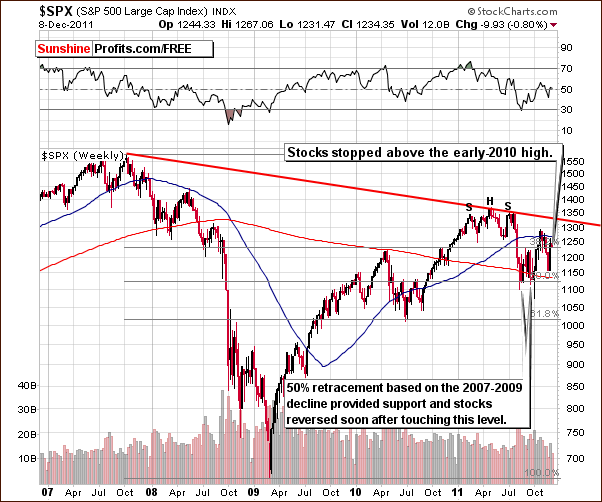
In the long-term S&P 500 Index chart, the index moved lower this week. Although daily moves have been quite volatile, the actual decline for the week has only amounted to about 0.8%. The current index level is still above the early 2010 highs which also coincide with the 38.2% Fibonacci retracement level. This retracement is based on the decline which began in late 2007 and lasted through early 2009. At this point, since the index is still above important support levels, the short-term outlook remains bullish.
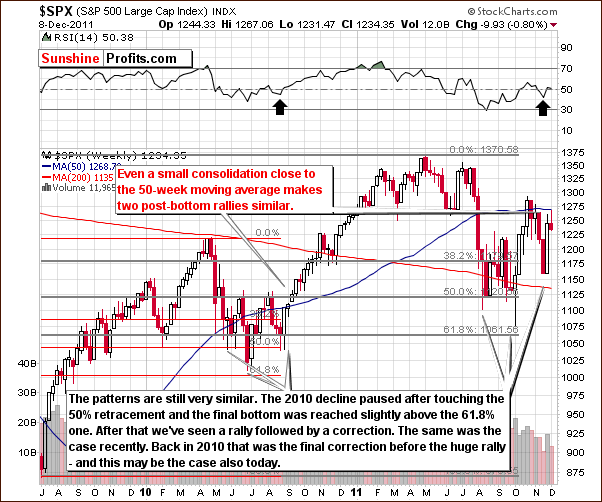
In the medium-term S&P 500 Index chart, we see a different and in our opinion even more interesting development. The current period of consolidation saw early-week moves to the upside and declines on Thursday. The index is now close to the 50-week moving average and this is a situation which was also seen near the middle of 2010. The trading patterns seen at that time were also quite similar to the price action of the past few months.
The implications here are bullish for stocks in general. Last year, when a period of consolidation was followed by a breakout above the 50-week moving average, a significant rally materialized. This rally saw the S&P 500 Index level rise from around 1125 to the 1340 level or so, a 19% increase in less than six months! A similar move could be seen once again in the coming months.
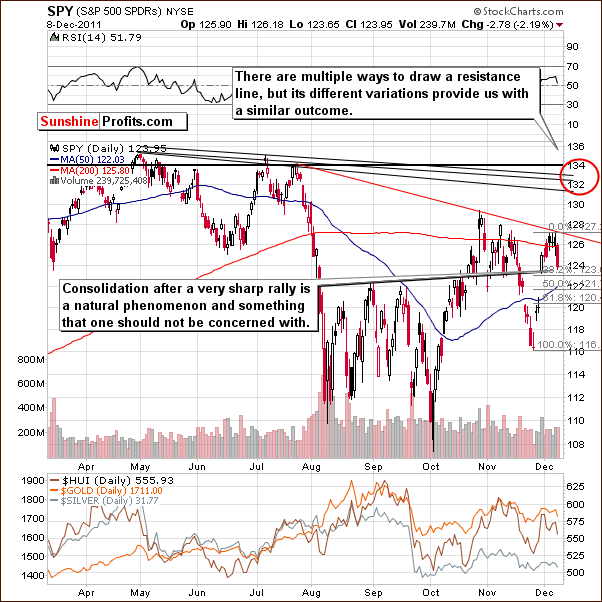
In the short-term SPY ETF, an initial target level close to the previous 2011 highs is still valid. This target ellipse is about 7% above Thursdays closing level and is obtained by extrapolating several resistance lines created from previous local tops seen earlier this year.
The recent consolidation period has not been too big relative to the previous rally. Whereas the recent rally spanned a $17 range in this ETF price, the subsequent decline has only amounted to about $3. Price levels are still visibly above the 38.2% Fibonacci retracement level, and for this reason, the short-term outlook continues to be bullish here.
Consequently, the overall picture for stocks is bullish. Can we say the same about mining stocks? Lets take a look.
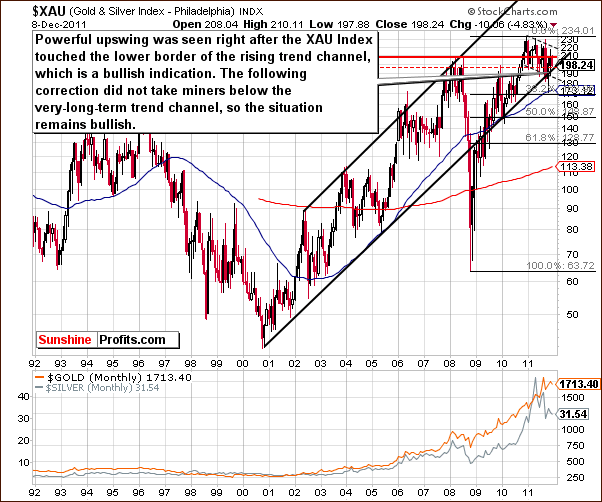
In the very-long term XAU gold and silver miners index chart, we see that the index has corrected after a very sharp rally but has not moved below the rising long-term trend channel. Since this level was touched but not broken, the long-term outlook remains bullish for the miners at this time.
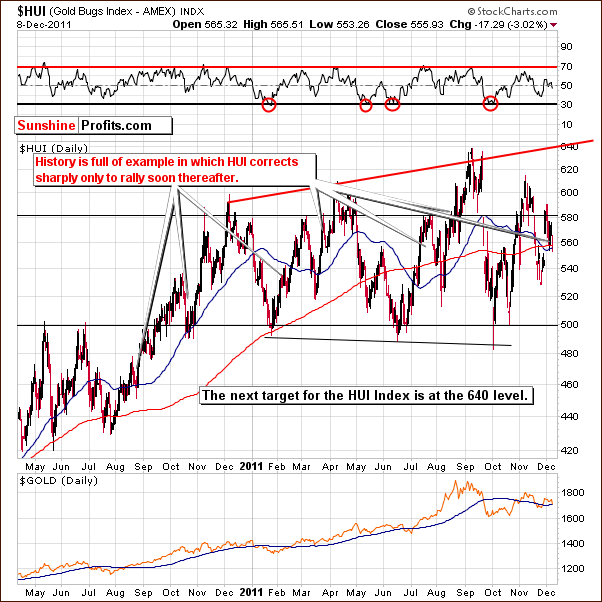
In the long-term HUI Index chart, we see a sharp decline, but it was far less dramatic than the rally which preceded it. Examples of such corrections are quite common in gold stocks and are often followed by subsequent rallies. Investors should not worry about catching each and every move in this sector (its impossible). Since it appears that a rally from here is likely, betting on higher prices at this time seems like a good idea.
Summing up, numerous signals from analysis of charts indicate that the outlook is bullish for both the general stock market and for precious metals stocks.
To make sure that you are notified once the new features are implemented, and get immediate access to my free thoughts on the market, including information not available publicly, we urge you to sign up for our free e-mail list. Sign up for our gold & silver mailing list today and you'll also get free, 7-day access to the Premium Sections on my website, including valuable tools and charts dedicated to serious PM Investors and Speculators. It's free and you may unsubscribe at any time.
Thank you for reading. Have a great weekend and profitable week!
P. Radomski
--
Is the bull market over because of Thursday's decline? Today's update includes analysis dedicated to putting this negative event into proper perspective in order to decide if long- and short-term Investors should be concerned with it. In particular we discuss several gold and silver charts (featuring silver long- and short-term cycles and silver:gold ratio), the situation in USD and Euro Indices, general stock market, XAU, HUI Indices and GDX ETF.
Moreover, today's issue includes our thoughts on the Elliott Wave Theory, gold hedging (from junior's and investor's perspective) and we provide an updated gold junior ranking.
Additionally, we comment on World Gold Council's suggestions for including gold in one's portfolio. We encourage you to Subscribe to the Premium Service today and read the full version of this week's analysis right away.

